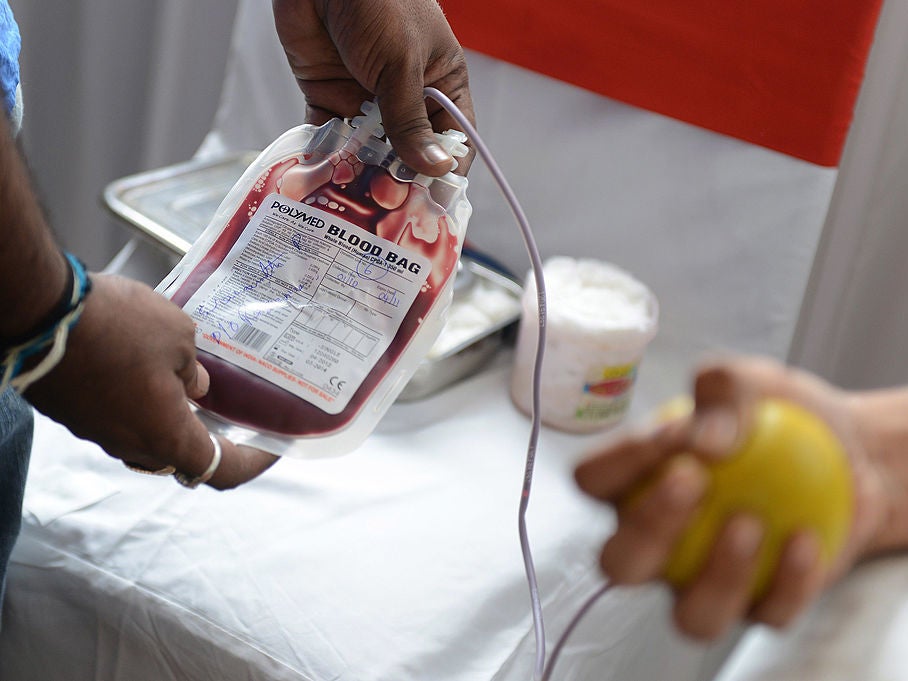Coronavirus: Scrap 'outdated' rules preventing gay and bisexual men donating blood, ministers told
‘Gay and bisexual men should not be denied the right to help in the fight against Covid-19’

Your support helps us to tell the story
From reproductive rights to climate change to Big Tech, The Independent is on the ground when the story is developing. Whether it's investigating the financials of Elon Musk's pro-Trump PAC or producing our latest documentary, 'The A Word', which shines a light on the American women fighting for reproductive rights, we know how important it is to parse out the facts from the messaging.
At such a critical moment in US history, we need reporters on the ground. Your donation allows us to keep sending journalists to speak to both sides of the story.
The Independent is trusted by Americans across the entire political spectrum. And unlike many other quality news outlets, we choose not to lock Americans out of our reporting and analysis with paywalls. We believe quality journalism should be available to everyone, paid for by those who can afford it.
Your support makes all the difference.Ministers are being urged to scrap “outdated” restrictions preventing gay and bisexual men from donating blood and antibodies to help with research into tackling coronavirus.
Current rules only allow men who have sex with men to donate blood after being celibate for three months – guidance that also applies to vital donations of plasma needed to develop treatments for Covid-19.
Men who have contracted coronavirus are now being urged to come forward by NHS Blood and Transplant (NHSBT) after studies found male blood plasma was likely to have a higher level of antibodies, which makes it more useful in saving lives.
A review of whether to bring in individual risk assessments is underway, but it has been delayed by the coronavirus pandemic, health minister Helen Whately recently confirmed in a parliamentary question to Liberal Democrat MP Layla Moran.
Ms Moran called for the review of the “arbitrary rules” to be sped up to allow gay and bisexual men to play their part in the battle against coronavirus.
The Lib Dem leadership contender said: “Gay and bisexual men should not be denied the right to help in the fight against Covid-19.
“The health secretary should urgently amend these outdated rules and allow gay and bisexual men to donate blood and antibodies like everybody else.
“Being able to donate blood should be based on scientific evidence not on sexual orientation. There should be individual risk assessments instead of arbitrary rules that exclude entire groups.”
She urged ministers to speed up the review in the light of the crisis, adding: “It’s clear the regulations in place are simply not fit for purpose.”
Ethan Spibey, from the campaign group Freedom to Donate, which has been leading efforts to overturn the ban, said gay and bisexual men were being ignored despite the need for 68,000 new male donors this year.
He said: “It is entirely understandable that people are not just upset, but outraged that they too are not able to do something so incredible like donating blood, which literally saves lives.
“By broadly assessing people in a homogeneous group such as gay and bi men, we believe the blood service is missing out on this significant potential of willing and safe donors.
“As NHS Blood and Transplant ask for more male donors to come forward and as the department of health is looking at how we ensure the future of a safe and sufficient blood supply, we would say the time has come to once and for all treat people as individuals via an individualised risk-based policy, not on the basis of their sexuality.”
Josh Bradlow, the head of policy at the charity Stonewall, said: “We know it’s really upsetting and frustrating for many gay and bi men who want to donate blood to help in the fight against coronavirus, but are being prevented from doing so.
“It’s untrue that every gay and bi man is a high-risk donor, and that’s why we’re calling for a system to be introduced that is based on individualised risk assessment of blood donors, rather than the restriction of an entire group.”
A Department of Health and Social Care spokesperson said: “We want as many people as possible to donate blood while minimising the risk of transmitting infections and are working closely with NHSBT to explore options for a more individualised risk approach to donor deferral.”
Join our commenting forum
Join thought-provoking conversations, follow other Independent readers and see their replies
Comments